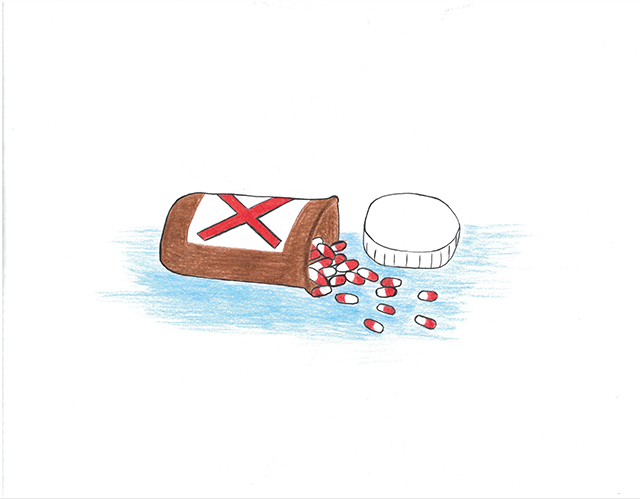
[dropcap]T[/dropcap]he conversation surrounding mental health is no longer conducted behind shut curtains or with hushed voices.
In the past couple of years, between international and national campaigns, the conversation surrounding mental health issues has finally emerged from behind the curtain. The stigma surrounding the topic is slowly melting away as we start to share our problems and wear green ribbons.
This encouragement to accept mental health issues as valid health issues has probably contributed to the increase in antidepressants prescriptions by two thirds since 2009, according to The Journal.ie.
Mental illness is no longer to be ignored. However, although more people are medicated for mental health issues, other services in the country lack behind. The HSE currently spends €400 million on medication for mental health, but only €10 million on counselling services, a report by the Oireachtas Joint Committee on the Future of Mental Healthcare has found. Medical professionals have felt the strain on the services when treating patients.
“When it comes to medication versus therapy it’s important to remember that it is never one or the other, it’s dependent on the person it can be a combination of both,” said Dr. John Hillery president of the College of Psychiatrists of Ireland.
“I was prescribing people medication to make up for service deficits,” Dr. Hillery said on the A Lust for Life podcast series, “so I was trying to make people safe, by putting them on medication it might help their anxiety and their agitation when I knew really that the main thing was environmental change or other interventions that aren’t available.”
A recent report conducted by children’s charity Barnardos found that 2,403 children are on the waiting list for mental health therapy. Fiona Birdy, a trained counsellor, believes that the HSE does not employ enough therapists.
“Because of this, I do think that GPs are more inclined to prescribe antidepressants than to refer patients to a therapist – because there’s simply not enough working for the HSE. A lot of therapists are expected to work voluntarily for charities, which can be emotionally and financially draining,” she said.
A lack of services comes into play in relation to patients with Borderline Personality Disorder (BPD). BPD is a disorder which cannot be treated with antidepressants, although many BPD patients also suffer from depression and anxiety. The Diagnostic and Statistical Manual of Mental Disorders lists the BPD symptoms such as fear of abandonment, recurrent suicidal behaviour and self harm, impulsivity and a chronic feeling of emptiness. The current recommended treatment for BPD is Dialectical Behavioural Therapy (DBT). Daniel Flynn, the Clinical Lead for the National Dialectical Behaviour Therapy Implementation Project in Ireland, explains although one per cent of the population meet the criteria for BPD, this jumps to 20 per cent in the mental health population.
“DBT is a relatively new form of therapy,” said Flynn, “Particularly in Ireland, it’s only been around for the past 10-15 years. We have recently trained 23 new teams.”
Despite the introduction of and further efforts to expand DBT services, many people with BPD across the country are still on waiting lists for the therapy. Kelly Ahern was put on the waiting list after her BPD diagnosis in March 2017 but she has heard nothing back since then. In the meantime, she was given worksheets to do herself.
“It felt like doing all the theory in Home Economics but still not knowing how to cook, I still didn’t know how to implement anything.”
Another person who wishes to remain anonymous due to the personality disorder’s stigma, was first diagnosed with BPD seven years ago and has yet to start DBT in Ireland.
“Ultimately I needed and still do need DBT. I cannot find places to do it privately, and when I do it’s so far from affordable,” they told The College View.
“Cognitive Behavioural Therapy (CBT) is so common and it’s great so many people are getting behind it, but DBT is never talked about. I’ve been medicated for anxiety/depression since I was 17, I’m 24 now and I’m still medicated. I can’t help but feel like although medication is keeping me functioning, the real problems are just being buried due to the lack of resources that are available here”.
There have been many mental health campaigns throughout the years, encouraging people to talk about their issues. Jess Harte, who was first prescribed antidepressants at 13 years of age, believes that although these have raised awareness on mental health, little has been done to remedy these problems.
“I think the onus is on people themselves to improve their mental health a lot of the time, by practising mindfulness or sharing what’s bothering you,” she added. “But your problems aren’t miraculously solved when you tell someone how you’re feeling. If I had Crohn’s disease and opened up about it, I’d still have Crohn’s disease. I’d still have to get treatment.”
It’s important to clarify that antidepressants can vastly improve peoples’ lives and allow them to function from day to day. Isobel Dunne, who suffers from anxiety and depression, has found an ultimately positive experience with the antidepressant (SSRI), Sertraline. She found counselling on its own merit was not improving her mental health. It was when she was prescribed antidepressants from her GP that Isobel finally saw an improvement, not only in her life but in the benefits of therapy.
“I had a much better experience with counselling this time because I was much more open to getting help after things got dire and my mind was a lot clearer. I think meds have genuinely changed my life for the better, I still have anxiety but it’s easier to deal with and is no longer an overwhelming presence in my life”.
Antidepressants can treat mental illness, they can be the ultimate saving grace for many, helping them to get out of bed in the morning and live a normal life. But in cases where medication was not the right remedy, these people have been left behind, largely to fend for themselves in the current system.
Aoibhín Bryant
Image credit: Sabrine Donohoe



